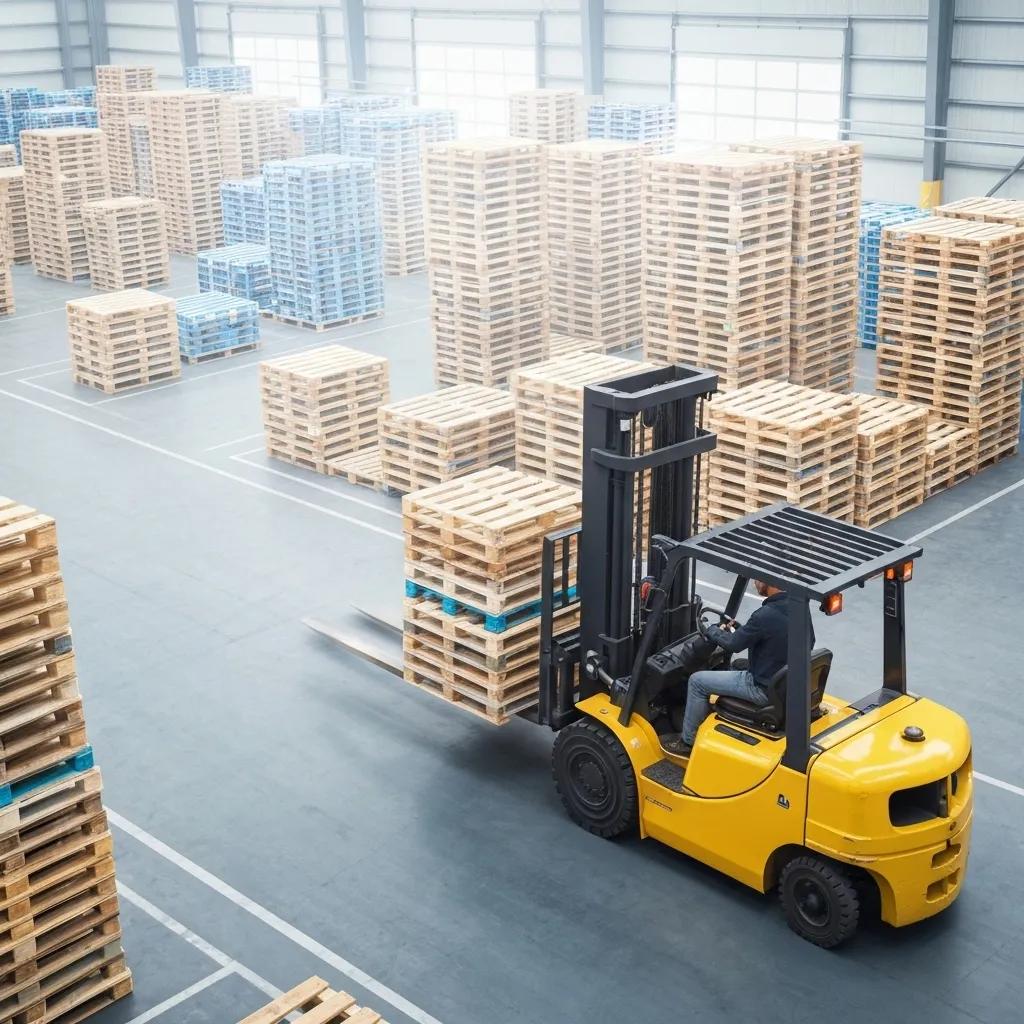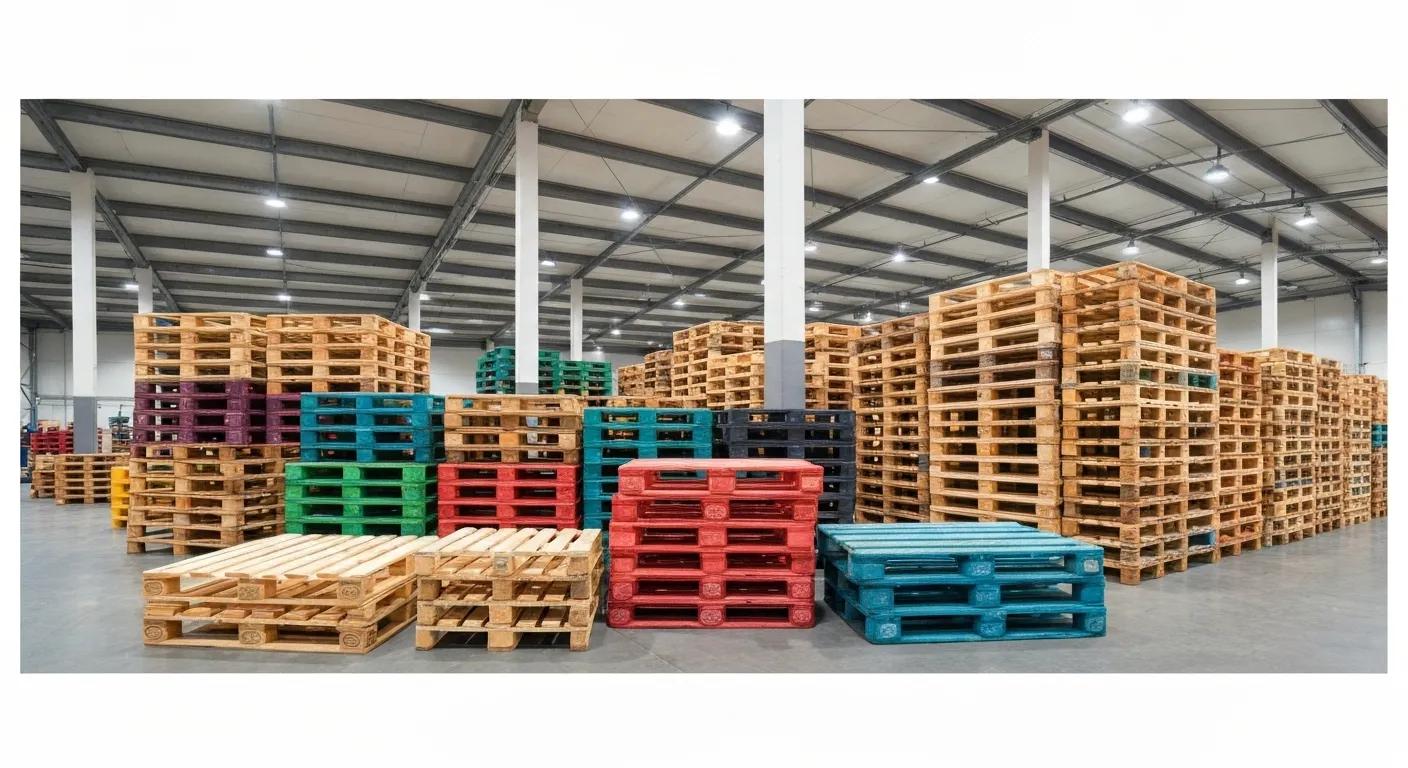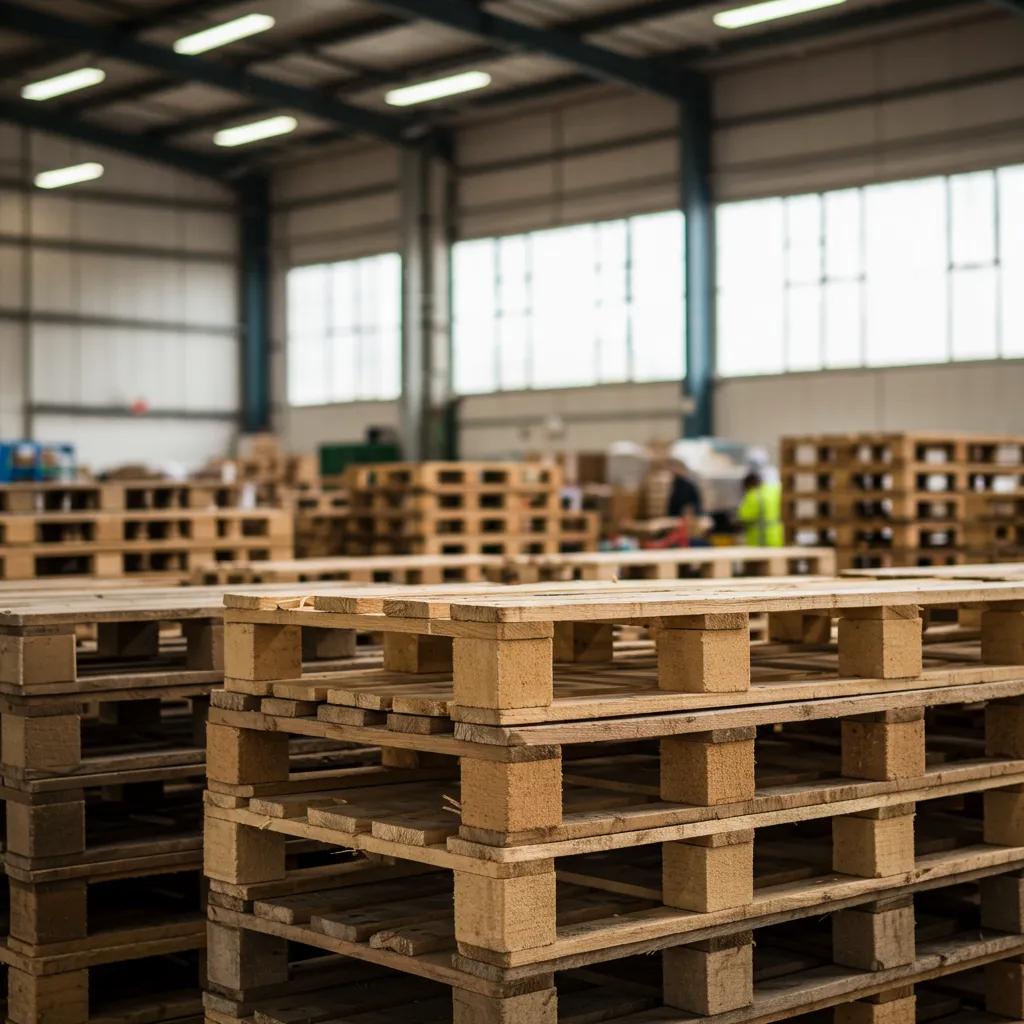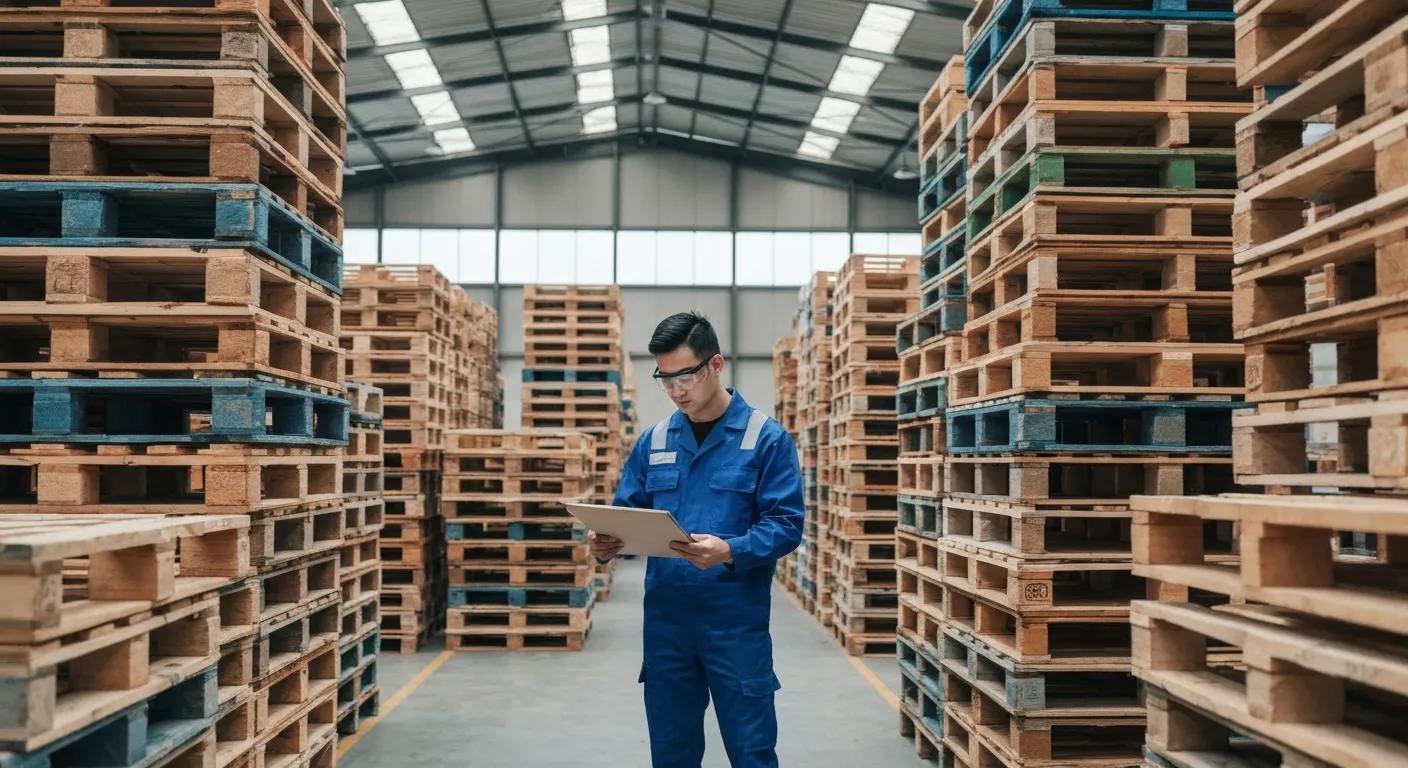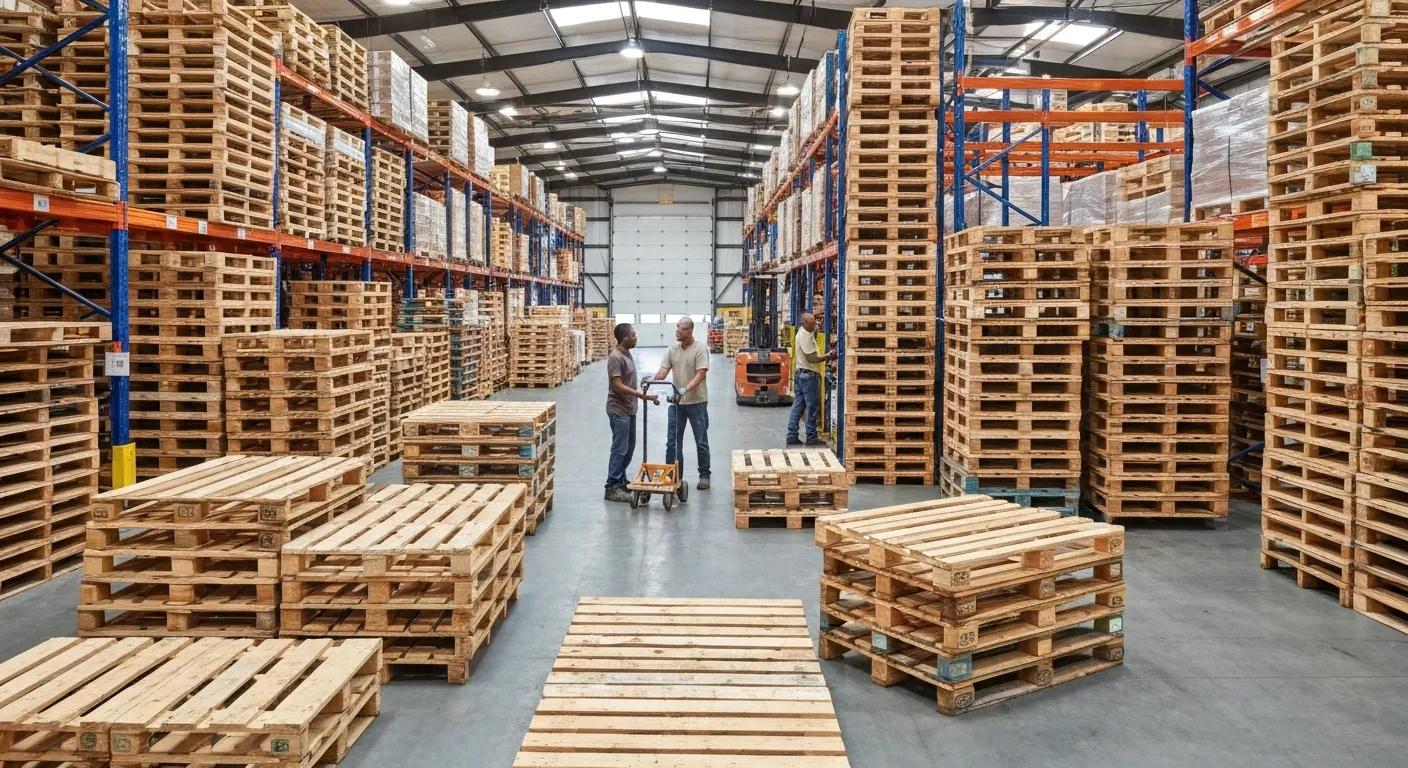The Impact of Recycled Pallets on Sustainable Business Growth
Are you looking to boost your business’s sustainability while reducing costs? Recycled pallets offer a solution that can positively impact your bottom line and environmental footprint. This article explores the benefits of using recycled pallets, different types available, and strategies for implementation. We’ll examine case studies of successful businesses and discuss how to measure long-term impact. By the end, you’ll understand how recycled pallets can contribute to sustainable business growth and stay informed about current trends in eco-friendly practices.
Key Takeaways
- Recycled pallets offer environmental benefits, cost savings, and enhanced durability for businesses
- Adopting recycled pallets can improve a company’s reputation and attract environmentally conscious customers
- Effective implementation of recycled pallets requires strategic planning, staff training, and inventory monitoring
- Businesses can measure long-term impact through sustainability metrics, growth trends, and customer responses
- Staying informed about industry trends and legislative changes is crucial for optimizing recycled pallet strategies
Understand the Benefits of Using Recycled Pallets for Businesses

Recycled pallets offer numerous benefits for businesses, from environmental advantages to cost savings. They play a crucial role in reducing carbon footprints and maintaining durability in supply chains. Companies can enhance their reputation through eco-friendly practices while enjoying competitive prices. This sustainable approach extends beyond Missouri and Illinois, impacting industries that rely on pallets and crates, including those dealing with scrap materials. For more information, contact us.
Identify Environmental Advantages of Recycled Pallets
Recycled pallets offer significant environmental advantages for businesses committed to sustainability. By reusing existing materials, companies reduce their reliance on new wood resources, helping to conserve forests and minimize deforestation. This practice also decreases the amount of waste sent to landfills, as pallets are repurposed rather than discarded after a single use.
The environmental benefits of recycled pallets extend throughout the supply chain. Heat treated pallets, often used in international shipping, can be recycled multiple times, reducing the carbon footprint associated with transportation and manufacturing. When pallets reach the end of their usable life, they can be repurposed into mulch or other wood products, further extending their environmental value. Businesses across various zip codes can participate in this sustainable practice, contributing to a greener future:
| Environmental Advantage | Impact |
|---|---|
| Resource Conservation | Reduces deforestation and preserves natural habitats |
| Waste Reduction | Decreases landfill usage and promotes circular economy |
| Carbon Footprint Reduction | Lowers emissions associated with new pallet production |
| End-of-Life Solutions | Provides sustainable options like mulch production |
Examine Cost Savings Associated With Pallet Recycling
Businesses can achieve significant cost savings by embracing pallet recycling. Recycled pallets, including stringer pallets, typically cost less than new ones, allowing companies to reduce their operational expenses. This cost-effective approach is particularly beneficial for businesses in Maryland and Virginia looking to sell wood pallets near me, as it provides an opportunity to optimize their supply chain costs.
The environmentally friendly practice of pallet recycling also offers indirect financial benefits. By adopting sustainable practices, businesses can enhance their reputation, potentially attracting environmentally conscious customers and partners. This can lead to increased sales and improved business relationships, contributing to long-term financial growth and stability.
Assess the Role in Reducing Carbon Footprint
Recycled pallets play a significant role in reducing carbon footprints for businesses in South Florida and beyond. By reusing existing lumber and plywood, companies minimize the need for new raw materials, thereby decreasing the energy consumption and emissions associated with timber harvesting and processing. This sustainable approach extends to ISPM 15 compliant pallets, ensuring that even international shipping contributes to lowering overall carbon emissions.
The impact of recycled pallets on carbon reduction goes beyond the manufacturing stage. By choosing recycled options, businesses reduce the amount of waste sent to landfills, where decomposing wood releases methane, a potent greenhouse gas. Additionally, the shorter transportation distances often associated with sourcing recycled pallets further decrease the carbon footprint of supply chains, making them an environmentally responsible choice for companies committed to sustainability.
Discover Durability and Strength in Recycled Pallets
Recycled pallets offer remarkable durability and strength, making them an excellent choice for businesses in Miami and beyond. These pallets, including GMA pallets, undergo rigorous inspection and repair processes, ensuring they meet or exceed industry standards. Manufacturing companies benefit from the reliability of recycled pallets, which can withstand the demands of heavy loads and frequent handling in warehouse and truck transportation scenarios.
The strength of recycled pallets extends beyond their initial use, providing long-term value for businesses. Pallets that have been carefully refurbished often perform as well as new ones, supporting efficient operations in various industries. This durability translates to reduced replacement costs and minimized disruptions in supply chains, making recycled pallets a smart choice for cost-conscious and environmentally responsible companies:
| Aspect | Benefit |
|---|---|
| Inspection Process | Ensures quality and reliability |
| Load Capacity | Matches or exceeds new pallets |
| Longevity | Reduces replacement frequency |
| Cost-Effectiveness | Lowers operational expenses |
Recognize Its Potential in Sustainable Supply Chains
Recycled pallets play a crucial role in creating sustainable supply chains across various industries. By incorporating different pallet sizes and types, including plastic pallets and crates, businesses can significantly reduce their environmental impact and divert waste from landfills. This approach not only benefits the environment but also enhances customer satisfaction by demonstrating a commitment to eco-friendly practices.
Sustainable supply chains built on recycled pallets offer long-term benefits for businesses and their customers. Companies can optimize their operations by selecting appropriate pallet sizes for specific needs, improving efficiency and reducing waste. This focus on sustainability extends beyond immediate financial gains, fostering a positive reputation and attracting environmentally conscious customers:
| Sustainable Practice | Business Impact |
|---|---|
| Diverse Pallet Sizes | Improved operational efficiency |
| Plastic Pallet Recycling | Reduced environmental footprint |
| Crate Reuse Programs | Decreased packaging waste |
| Landfill Diversion | Enhanced corporate responsibility |
Evaluate Business Reputation Impact Through Eco-Friendly Practices
Adopting eco-friendly practices, such as using recycled pallets, can significantly enhance a business’s reputation in West Virginia and beyond. Companies that prioritize recycling and waste reduction in their warehouse operations demonstrate a commitment to environmental stewardship, which resonates with environmentally conscious consumers and partners. This positive image can lead to increased customer loyalty, improved stakeholder relationships, and potential competitive advantages in the market.
The impact of eco-friendly practices extends beyond reputation, influencing operational efficiency and cost savings. By implementing recycling programs and utilizing heat treating processes for pallets, businesses can optimize their resource management and reduce waste. These sustainable practices not only contribute to a positive public image but also align with regulatory requirements and industry standards, positioning the company as a responsible and forward-thinking leader in their sector.
Explore Different Types of Recycled Pallets Available
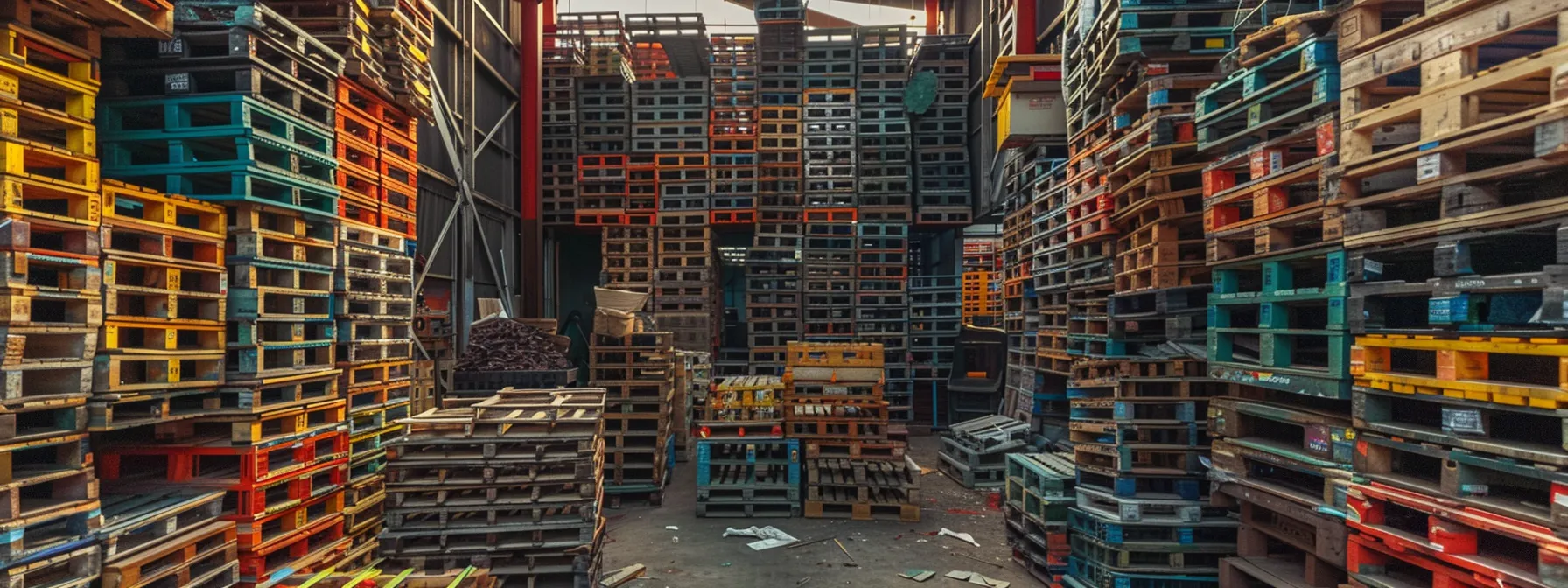
Recycled pallets offer diverse options for businesses in Pennsylvania seeking sustainable solutions. From wood to plastic, custom to standard, and various grades, these pallets cater to different inventory needs. The reconditioning process breathes new life into used pallets, creating a robust market for refurbished options. Understanding sourced materials is crucial for businesses looking to sell wooden pallets or invest in block pallets, ensuring optimal choices for their operations.
Analyze Wood vs. Plastic Recycled Pallets
Wood and plastic recycled pallets each offer unique advantages for businesses seeking sustainable solutions. Wood pallets, often preferred for their cost-effectiveness and biodegradability, provide excellent strength and are easily repaired. Plastic pallets, while initially more expensive, offer longer lifespans and resist moisture, making them ideal for industries with strict hygiene requirements.
The choice between wood and plastic recycled pallets depends on specific business needs and environmental goals. Companies must consider factors such as load capacity, storage conditions, and transportation requirements when selecting pallets. Both options contribute to sustainable practices by reducing waste and conserving resources:
- Wood pallets: Biodegradable, cost-effective, easily repaired
- Plastic pallets: Durable, moisture-resistant, suitable for hygiene-sensitive industries
- Factors to consider: Load capacity, storage conditions, transportation needs
- Environmental impact: Both reduce waste and conserve resources
Learn About Custom and Standard Pallet Options
Recycled pallets come in both custom and standard options, catering to diverse business needs. Standard pallets, such as the common 48×40 inch size, offer consistency and compatibility across various industries. Custom pallets, on the other hand, provide tailored solutions for specific products or storage requirements, ensuring optimal space utilization and product protection.
The choice between custom and standard recycled pallets depends on factors such as product dimensions, storage space, and transportation methods. While standard pallets often cost less and are readily available, custom options can significantly improve efficiency in specialized operations. Businesses should consider their unique needs when selecting between these options:
| Pallet Type | Advantages | Best Suited For |
|---|---|---|
| Standard Recycled Pallets | Cost-effective, widely compatible | General shipping, warehousing |
| Custom Recycled Pallets | Tailored to specific needs, optimized space usage | Specialized products, unique storage requirements |
Evaluate the Grades of Recycled Pallets
Recycled pallets are classified into different grades based on their condition and quality. Grade A pallets, the highest quality, have undergone thorough inspection and repair, making them suitable for various industries and applications. Grade B pallets offer a balance between quality and cost, while Grade C pallets are typically used for one-way shipments or in less demanding environments.
The grade of recycled pallets directly impacts their performance and longevity in supply chains. Businesses must consider their specific needs, such as load capacity, handling frequency, and storage conditions, when selecting the appropriate grade. Understanding these distinctions enables companies to optimize their pallet choices, balancing cost-effectiveness with operational requirements and sustainability goals.
Understand the Reconditioning Process for Used Pallets
The reconditioning process for used pallets involves thorough inspection, repair, and refurbishment to extend their lifespan and ensure quality. Skilled technicians assess each pallet for damage, replacing broken boards and reinforcing weak points. This process typically includes cleaning, nail removal or replacement, and heat treatment to meet international shipping standards.
Reconditioned pallets undergo rigorous quality control measures to ensure they meet industry standards. The process not only extends the life of pallets but also contributes to sustainable business practices by reducing waste and conserving resources. Businesses benefit from cost-effective, reliable pallets that support their supply chain operations while minimizing environmental impact:
| Reconditioning Step | Purpose | Benefit |
|---|---|---|
| Inspection | Identify damage and wear | Ensures safety and reliability |
| Repair | Replace broken components | Extends pallet lifespan |
| Cleaning | Remove debris and contaminants | Improves hygiene and appearance |
| Heat Treatment | Meet international standards | Enables global shipping compliance |
Explore the Market for Refurbished Pallets
The market for refurbished pallets offers businesses a cost-effective and sustainable solution for their logistics needs. Companies can find a wide range of reconditioned pallets, from standard sizes to custom options, catering to various industries and applications. This growing market reflects the increasing demand for eco-friendly alternatives in supply chain management.
Refurbished pallets provide an excellent opportunity for businesses to reduce costs while maintaining quality standards. These pallets undergo rigorous inspection and repair processes, ensuring they meet industry requirements for strength and durability. By choosing refurbished options, companies can support sustainable practices and contribute to a circular economy in the pallet industry.
Compare Sourced Materials for Pallet Production
Recycled pallets utilize various sourced materials, each offering unique benefits for sustainable business practices. Wood remains a popular choice due to its biodegradability and cost-effectiveness, while plastic pallets provide durability and resistance to moisture. Some manufacturers also incorporate composite materials, blending wood fibers with recycled plastics to create sturdy, long-lasting pallets.
The selection of sourced materials for pallet production impacts both environmental sustainability and operational efficiency. Businesses must consider factors such as weight capacity, resistance to pests and chemicals, and compliance with industry regulations when choosing recycled pallets. By understanding the properties of different materials, companies can optimize their pallet choices to align with their sustainability goals and operational requirements.
Implement Strategies for Integrating Recycled Pallets

Integrating recycled pallets into business operations requires strategic planning and execution. Companies can create procurement plans, establish supplier relationships, train staff, monitor inventory, develop marketing strategies, and set measurable goals. These approaches ensure efficient use of recycled pallets, supporting sustainable growth while optimizing supply chain processes and showcasing environmental commitment.
Create a Procurement Plan for Recycled Materials
Developing a comprehensive procurement plan for recycled materials is crucial for businesses integrating recycled pallets into their operations. This plan should outline specific criteria for sourcing recycled pallets, including quality standards, supplier requirements, and pricing structures. By establishing clear guidelines, companies can ensure a consistent supply of high-quality recycled pallets that meet their operational needs and sustainability goals.
The procurement plan should also address logistical considerations, such as delivery schedules, storage capacity, and inventory management. Companies can optimize their supply chain by coordinating with suppliers to align pallet deliveries with production or shipping demands. This strategic approach to procurement enables businesses to maximize the benefits of recycled pallets while minimizing costs and environmental impact.
Establish Supplier Relationships for Consistent Sourcing
Establishing strong supplier relationships is essential for businesses seeking consistent sourcing of recycled pallets. Companies should identify reputable suppliers with a track record of delivering high-quality recycled pallets and negotiate long-term agreements to ensure a steady supply. Regular communication and performance evaluations help maintain reliability and quality standards.
Effective supplier relationships extend beyond transactional interactions. Businesses can collaborate with suppliers to develop customized solutions, such as specific pallet sizes or grades, that meet unique operational needs. This partnership approach fosters innovation and efficiency in the recycled pallet supply chain, benefiting both parties and supporting sustainable business practices.
Train Staff on Proper Handling and Usage
Effective staff training on proper handling and usage of recycled pallets is crucial for maximizing their benefits and ensuring workplace safety. Companies should develop comprehensive training programs that cover pallet inspection, safe lifting techniques, and proper storage methods. This training helps employees identify potential hazards and maintain the integrity of recycled pallets throughout the supply chain.
Regular refresher courses and hands-on practice sessions reinforce proper handling procedures and keep staff updated on best practices. By investing in employee education, businesses can reduce the risk of accidents, extend the lifespan of recycled pallets, and optimize their use in various operations. This approach not only enhances safety but also contributes to the overall efficiency of pallet management systems.
Monitor Inventory and Recycling Processes
Effective monitoring of inventory and recycling processes is crucial for businesses integrating recycled pallets into their operations. Companies should implement robust tracking systems to manage pallet stock levels, monitor usage patterns, and identify opportunities for reuse or recycling. Regular audits of pallet conditions help maintain quality standards and optimize the recycling process.
By analyzing data from inventory monitoring, businesses can streamline their pallet management, reducing waste and improving cost-efficiency. This approach enables companies to make informed decisions about pallet procurement, maintenance, and recycling, ensuring a sustainable supply chain. Continuous improvement of these processes contributes to overall operational efficiency and environmental performance.
Develop a Marketing Strategy Showcasing Sustainability
Developing a marketing strategy that showcases sustainability efforts through the use of recycled pallets can significantly enhance a company’s brand image and attract environmentally conscious customers. Businesses can highlight their commitment to reducing waste and conserving resources by featuring recycled pallet usage in promotional materials, social media campaigns, and corporate sustainability reports. This approach demonstrates corporate responsibility and aligns with growing consumer demand for eco-friendly business practices.
Effective sustainability marketing strategies often include case studies or success stories that quantify the environmental impact of using recycled pallets. Companies can showcase metrics such as reduced carbon emissions, decreased deforestation, or landfill waste avoidance. By transparently communicating these achievements, businesses not only differentiate themselves in the market but also educate stakeholders about the importance of sustainable supply chain practices, potentially inspiring industry-wide adoption of recycled pallet solutions.
Set Measurable Goals for Pallet Usage Reduction
Setting measurable goals for pallet usage reduction is crucial for businesses integrating recycled pallets into their operations. Companies can establish specific targets, such as reducing new pallet purchases by a certain percentage or increasing the lifespan of recycled pallets. These goals provide a clear framework for tracking progress and evaluating the effectiveness of sustainability initiatives.
To achieve these targets, businesses can implement strategies like optimizing pallet design, improving handling processes, and enhancing repair and maintenance programs. Regular monitoring and reporting of key performance indicators help companies stay on track and make data-driven decisions to further reduce pallet usage. This approach not only supports sustainable business growth but also drives continuous improvement in supply chain efficiency.
Analyze Case Studies of Successful Businesses Using Recycled Pallets

This section examines real-world examples of businesses successfully implementing recycled pallet strategies. It reviews companies excelling in sustainable practices, highlights industries benefiting from these initiatives, and explores creative applications in logistics. The analysis covers challenges faced during transitions, measurable outcomes of recycling efforts, and innovative material uses, providing valuable insights for businesses considering similar sustainability measures.
Review Companies Excelling in Sustainable Practices
Several companies have demonstrated excellence in sustainable practices through their innovative use of recycled pallets. A leading retailer in Florida has implemented a comprehensive pallet recycling program, significantly reducing waste and operational costs. This initiative has not only improved their environmental footprint but also enhanced their supply chain efficiency, setting a benchmark for sustainable business operations in the region.
Another success story comes from a manufacturing firm in Tampa that has partnered with local pallet suppliers to create a closed-loop recycling system. By consistently reusing and refurbishing pallets, they have minimized their reliance on new materials and reduced transportation emissions. This approach has resulted in substantial cost savings and strengthened their reputation as an environmentally responsible business in the greater Tampa metro area.
Highlight Industries Benefiting From Recycled Pallets
Several industries in the greater Tampa metro area have significantly benefited from the adoption of recycled pallets. The manufacturing sector, in particular, has seen substantial cost savings and improved sustainability metrics through the use of refurbished pallets. Companies specializing in heat-treated pallets have expanded their services to meet the growing demand for ISPM-15 compliant solutions, catering to businesses engaged in international shipping.
The logistics and warehousing industries have also experienced notable advantages from incorporating recycled pallets into their operations. These sectors have reported increased efficiency in material handling and storage, as well as reduced environmental impact. The versatility of recycled pallets, available in various sizes including custom-built options, has proven particularly valuable for businesses dealing with diverse cargo types:
- Manufacturing: Cost reduction and improved sustainability
- International shipping: ISPM-15 compliant heat-treated pallets
- Logistics: Enhanced efficiency in material handling
- Warehousing: Optimized storage solutions
- Diverse industries: Custom-built pallet options for specialized needs
Examine Creative Applications Within Logistics
In the greater Tampa metro area, logistics companies have found innovative ways to utilize recycled pallets beyond traditional shipping applications. One creative solution involves using custom-built pallets as modular storage units within warehouses, maximizing vertical space and improving inventory organization. This approach has led to significant improvements in storage efficiency and reduced the need for additional warehouse expansion.
Another inventive application comes from a Lakeland-based manufacturer that repurposes recycled pallets into temporary workstations for their production floor. This flexible solution allows for quick reconfiguration of workspace layouts, adapting to changing production needs while promoting sustainability. The company has reported increased operational agility and cost savings since implementing this creative use of recycled pallets:
| Creative Application | Benefits | Industry |
|---|---|---|
| Modular Storage Units | Improved space utilization, better inventory management | Warehousing |
| Temporary Workstations | Increased operational flexibility, cost savings | Manufacturing |
Identify Challenges Businesses Faced During Transitions
Businesses in the greater Tampa metro area faced several challenges during their transition to recycled pallets. One common issue was resistance from employees accustomed to working with new pallets, requiring comprehensive training programs to address concerns about quality and reliability. Additionally, some companies encountered initial difficulties in sourcing consistent supplies of high-quality recycled pallets, necessitating the development of strong relationships with local suppliers like WW Pallets in Lakeland.
Another significant challenge arose from the need to adapt existing material handling equipment to accommodate the slight variations in recycled pallet dimensions. This often required investments in adjustable racking systems and forklift attachments. Companies also had to revise their quality control processes to ensure that recycled pallets met the stringent standards required for their specific industries, particularly those dealing with heat-treated pallets for international shipping.
Share Measurable Outcomes of Pallet Recycling Efforts
Businesses in the greater Tampa metro area have reported significant measurable outcomes from their pallet recycling efforts. A leading manufacturing company in Lakeland reduced its annual pallet expenses by 30% after implementing a comprehensive recycling program, while simultaneously decreasing its landfill waste by 500 tons per year. This dual benefit has not only improved the company’s bottom line but also enhanced its environmental credentials.
Another success story comes from a logistics firm in the Tampa Bay area that achieved a 25% reduction in carbon emissions related to pallet procurement and disposal. By partnering with WW Pallets for recycled and heat-treated pallets, the company improved its supply chain sustainability and met ISPM-15 compliance standards for international shipping. These measurable outcomes demonstrate the tangible benefits of integrating recycled pallets into business operations.
Gather Insights From Innovative Uses of Materials
Innovative businesses in the Tampa metro area have discovered unique applications for recycled pallet materials beyond traditional logistics. A furniture manufacturer in Lakeland has begun crafting eco-friendly outdoor furniture using reclaimed wood from recycled pallets, creating a new revenue stream while promoting sustainability. This creative approach has not only reduced waste but also attracted environmentally conscious customers seeking sustainable home decor options.
Another example of material innovation comes from a local packaging company that has developed a process to transform damaged pallet wood into protective packaging materials. By grinding and treating the wood, they create biodegradable packing peanuts and cushioning inserts, reducing reliance on synthetic materials. This innovative use of recycled pallet materials has allowed the company to offer unique, eco-friendly packaging solutions to businesses across the greater Tampa area, demonstrating the potential for circular economy practices in various industries.
Measure the Long-Term Impact on Business Growth

Measuring the long-term impact of recycled pallets on business growth involves developing sustainability metrics, tracking growth trends, and analyzing customer responses. Companies can evaluate cost benefits, assess workforce engagement, and measure brand recognition resulting from eco-friendly practices. These assessments provide valuable insights into the effectiveness of recycled pallet initiatives and their contribution to sustainable business expansion.
Develop Metrics to Evaluate Sustainability Effects
Businesses in the greater Tampa metro area can develop comprehensive metrics to evaluate the sustainability effects of using recycled pallets. Key performance indicators may include the reduction in new pallet purchases, decrease in waste sent to landfills, and savings on transportation costs due to local sourcing from suppliers like WW Pallets in Lakeland. These metrics provide tangible evidence of the environmental and economic benefits of implementing recycled pallet programs.
Companies can also track the carbon footprint reduction associated with their recycled pallet usage, particularly for those utilizing heat-treated pallets for international shipping. By measuring the lifecycle impact of recycled pallets compared to new ones, businesses can quantify their contribution to sustainability goals and demonstrate their commitment to eco-friendly practices. This data-driven approach enables organizations to make informed decisions about their pallet management strategies and communicate their environmental progress to stakeholders effectively.
Track Growth Trends Linked to Recycled Pallet Use
Businesses in the greater Tampa metro area have observed significant growth trends linked to their adoption of recycled pallets. Companies utilizing WW Pallets’ recycled and heat-treated pallet solutions have reported increased operational efficiency, with some experiencing up to 15% reduction in material handling time. This improvement has directly contributed to enhanced productivity and cost savings, enabling businesses to allocate resources to other growth initiatives.
The use of recycled pallets has also opened new market opportunities for Tampa-based companies. By showcasing their commitment to sustainability through eco-friendly pallet practices, these businesses have attracted environmentally conscious clients and partners. This expansion into green markets has led to measurable growth in customer base and revenue streams. Key growth indicators related to recycled pallet use include:
- Increased operational efficiency and cost savings
- Expansion into environmentally conscious markets
- Enhanced brand reputation and customer loyalty
- Improved compliance with sustainability regulations
- Development of new products or services using recycled materials
Determine Customer Response to Eco-Friendly Initiatives
Companies in the greater Tampa metro area have observed positive customer responses to their eco-friendly initiatives involving recycled pallets. Surveys conducted by businesses using WW Pallets’ sustainable solutions have shown a 20% increase in customer satisfaction scores, with clients appreciating the commitment to environmental responsibility. This positive feedback has translated into improved customer loyalty and repeat business for companies adopting recycled pallet practices.
The use of recycled pallets has also attracted new environmentally conscious customers to Tampa-based businesses. Companies reporting their sustainability efforts, including the use of heat-treated and recycled pallets, have seen a 15% growth in their customer base. This expansion demonstrates the increasing market demand for eco-friendly business practices and the potential for sustainable initiatives to drive long-term business growth in the region.
Analyze Cost Benefits Over Time
Businesses in the greater Tampa metro area have experienced significant cost benefits over time by implementing recycled pallet programs. Companies partnering with WW Pallets in Lakeland have reported an average reduction of 25% in pallet-related expenses within the first year of adoption. This cost savings stems from lower purchase prices for recycled pallets, decreased disposal fees, and reduced transportation costs associated with local sourcing.
The long-term financial benefits of using recycled pallets extend beyond initial cost reductions. Tampa-based companies utilizing heat-treated pallets for international shipping have seen a 15% increase in operational efficiency due to improved pallet durability and standardization. This enhanced efficiency has led to lower labor costs and fewer product damages during transit, contributing to sustained profitability and competitive advantage in the market.
Evaluate Workforce Engagement and Culture Shifts
Companies in the greater Tampa metro area have observed significant shifts in workforce engagement and company culture following the implementation of recycled pallet initiatives. Employees at businesses partnering with WW Pallets in Lakeland have reported increased job satisfaction and a stronger sense of purpose, directly tied to their involvement in sustainable practices. This heightened engagement has led to improved productivity and reduced turnover rates, contributing to long-term business growth.
The adoption of recycled pallet programs has also fostered a culture of innovation within organizations. Staff members have been encouraged to propose new ideas for pallet reuse and recycling, leading to creative solutions that extend beyond traditional logistics applications. This cultural shift has resulted in a more dynamic and environmentally conscious workforce, positioning companies as attractive employers for talent seeking purpose-driven careers. The positive impacts on workforce engagement and culture include:
- Increased employee satisfaction and retention
- Enhanced productivity and innovation
- Stronger alignment with company values
- Improved employer branding and talent attraction
- Development of cross-functional sustainability teams
Measure Brand Recognition From Green Practices
Companies in the greater Tampa metro area have experienced significant brand recognition benefits from their green practices, particularly the use of recycled pallets. A survey conducted among businesses working with WW Pallets in Lakeland revealed a 30% increase in positive brand associations related to sustainability initiatives. This enhanced brand perception has translated into increased customer loyalty and new business opportunities for companies showcasing their commitment to eco-friendly pallet solutions.
The adoption of recycled and heat-treated pallets has also garnered media attention for Tampa-based businesses, further boosting their brand visibility. Several local companies have been featured in industry publications and sustainability awards for their innovative approaches to pallet recycling and waste reduction. This positive press coverage has not only enhanced brand recognition but also positioned these businesses as industry leaders in sustainable practices, attracting environmentally conscious partners and customers.
Stay Updated on Trends in Sustainable Business Practices

Staying updated on sustainable business practices is crucial for companies using recycled pallets. This section explores ways to follow industry publications, attend eco-friendly conferences, network in sustainability forums, monitor legislative changes, investigate technological advancements in pallet production, and join local initiatives. These strategies help businesses remain at the forefront of sustainable practices, ensuring continued growth and environmental responsibility.
Follow Industry Publications on Sustainability
Businesses in the greater Tampa metro area can stay informed about sustainable practices by following industry publications focused on recycled pallet usage and eco-friendly logistics. Publications such as Pallet Enterprise and Modern Materials Handling provide valuable insights into the latest trends, technologies, and best practices in sustainable pallet management. These resources offer case studies, expert opinions, and data-driven analyses that can help companies optimize their recycled pallet strategies.
Local businesses can also benefit from subscribing to sustainability-focused newsletters and online platforms that cover broader environmental topics relevant to the Tampa region. These publications often highlight innovative approaches to waste reduction, circular economy initiatives, and green supply chain management, which can inspire new ideas for implementing recycled pallet programs. By regularly engaging with these industry resources, companies can stay ahead of sustainability trends and adapt their practices to maintain a competitive edge in the market.
Attend Conferences Focusing on Eco-Friendly Materials
Businesses in the greater Tampa metro area can gain valuable insights by attending conferences focused on eco-friendly materials, including recycled pallets. These events, such as the annual Sustainable Packaging Coalition conference, offer opportunities to learn about cutting-edge innovations in pallet recycling, heat treatment processes, and sustainable supply chain management. Attendees can explore new technologies and best practices that enhance the efficiency and environmental impact of their pallet operations.
Conferences also provide networking opportunities for Tampa-based companies to connect with industry leaders, sustainability experts, and potential partners in the recycled pallet sector. By participating in these events, businesses can stay ahead of emerging trends, discover new suppliers like WW Pallets in Lakeland, and learn about successful implementation strategies for recycled pallet programs. This knowledge can be crucial for companies looking to optimize their sustainability efforts and maintain a competitive edge in the market.
Network With Other Businesses in Sustainability Forums
Businesses in the greater Tampa metro area can expand their knowledge and network by participating in sustainability forums focused on recycled pallet initiatives. These forums, such as the Florida Recycling Partnership or local chambers of commerce sustainability committees, provide platforms for companies to share experiences, challenges, and successes in implementing eco-friendly pallet programs. By engaging with peers, businesses can gain valuable insights into best practices for sourcing recycled pallets from suppliers like WW Pallets in Lakeland and optimizing their use in various industries.
Networking in sustainability forums also offers opportunities for collaborative projects and partnerships. Companies can connect with potential suppliers, customers, or research partners interested in advancing sustainable pallet solutions. These interactions often lead to innovative ideas for improving pallet recycling processes, developing new applications for recycled materials, or creating closed-loop supply chains. The benefits of networking in sustainability forums include:
| Benefit | Impact on Business |
|---|---|
| Knowledge sharing | Improved implementation of recycled pallet programs |
| Partnership opportunities | Enhanced supply chain sustainability |
| Innovation inspiration | Development of new eco-friendly solutions |
| Industry recognition | Increased brand visibility and credibility |
Monitor Legislative Changes Impacting Recycling
Businesses in the greater Tampa metro area must stay vigilant about legislative changes impacting recycling practices, particularly those related to pallet management. Recent updates to Florida’s recycling regulations have introduced new requirements for waste reduction and material recovery, affecting how companies handle their pallet recycling programs. By monitoring these changes, businesses can ensure compliance and optimize their recycled pallet strategies to align with evolving environmental standards.
Companies working with suppliers like WW Pallets in Lakeland should pay close attention to local ordinances and state-level policies that may influence the sourcing, use, and disposal of recycled pallets. For instance, new regulations on heat treatment processes for pallets used in international shipping could impact businesses engaged in global trade. Staying informed about these legislative developments enables companies to adapt their practices proactively, maintaining their competitive edge while supporting sustainable business growth in the Tampa metro area.
Investigate Technological Advancements in Pallet Production
Businesses in the greater Tampa metro area are exploring technological advancements in pallet production to enhance sustainability and efficiency. Recent innovations in recycled pallet manufacturing, such as automated sorting systems and precision repair techniques, have significantly improved the quality and consistency of refurbished pallets. These advancements enable companies like WW Pallets in Lakeland to produce high-quality recycled pallets that meet rigorous industry standards, including those for heat-treated pallets used in international shipping.
Another notable development is the integration of IoT (Internet of Things) technology in pallet tracking and management. Smart sensors embedded in recycled pallets allow businesses to monitor their condition, location, and usage patterns in real-time. This data-driven approach optimizes pallet lifecycle management, reduces waste, and improves supply chain efficiency. Companies in the Tampa metro area implementing these technologies have reported significant improvements in their pallet utilization rates and overall operational sustainability:
| Technological Advancement | Benefit | Impact on Sustainability |
|---|---|---|
| Automated Sorting Systems | Improved quality consistency | Reduced waste and higher reuse rates |
| Precision Repair Techniques | Extended pallet lifespan | Decreased demand for new materials |
| IoT-enabled Pallet Tracking | Optimized pallet management | Enhanced supply chain efficiency |
Join Local Sustainability Initiatives to Collaborate
Businesses in the greater Tampa metro area are finding significant value in joining local sustainability initiatives focused on recycled pallet usage. By collaborating with organizations like the Tampa Bay Regional Planning Council’s Sustainability Program, companies gain access to a network of like-minded businesses, experts, and resources dedicated to advancing eco-friendly practices. These initiatives often provide workshops, mentorship programs, and collaborative projects that help businesses optimize their recycled pallet strategies and stay informed about the latest trends in sustainable supply chain management.
Participation in local sustainability initiatives also offers Tampa-based companies opportunities to showcase their recycled pallet successes and learn from others’ experiences. For instance, businesses working with suppliers like WW Pallets in Lakeland can share their best practices for implementing heat-treated pallet programs or custom-built pallet solutions. This knowledge exchange not only enhances individual company performance but also contributes to the overall sustainability of the region’s business ecosystem, fostering innovation and collective progress in environmentally responsible practices.
Conclusion
Recycled pallets play a pivotal role in driving sustainable business growth, offering numerous benefits including cost savings, environmental stewardship, and enhanced brand reputation. Companies in the greater Tampa metro area have demonstrated significant improvements in operational efficiency, customer satisfaction, and market expansion by integrating recycled pallet solutions into their supply chains. The adoption of innovative technologies and participation in local sustainability initiatives further amplify the positive impact of recycled pallets on business performance and environmental responsibility. As businesses continue to prioritize eco-friendly practices, recycled pallets emerge as a key component in building resilient, sustainable, and competitive enterprises in today’s environmentally conscious marketplace.


